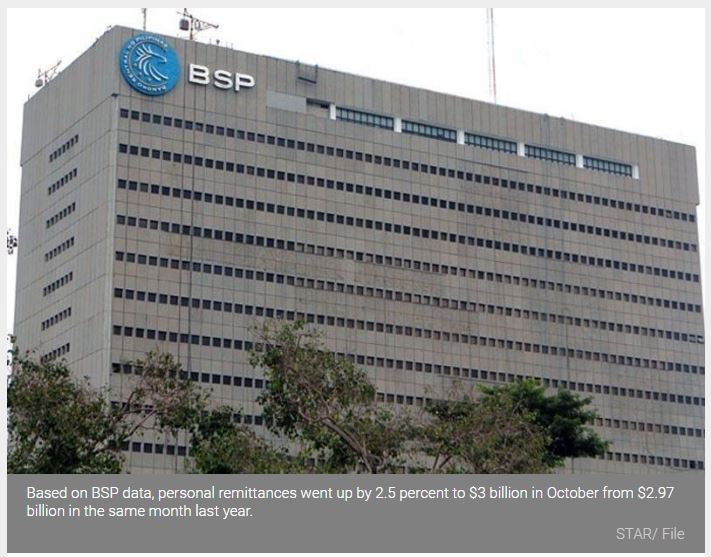Philippines: Remittances slowly picking up
Higher inflow for 2nd straight month in October
MANILA, Philippines — Remittances increased for the second straight month in October as overseas Filipino workers (OFWs) continued to find a way to send their hard-earned money despite the challenges brought about by the pandemic, the Bangko Sentral ng Pilipinas (BSP) said yesterday.
Based on BSP data, personal remittances went up by 2.5 percent to $3 billion in October from $2.97 billion in the same month last year.
Personal remittances from land-based workers with work contracts of one year or more increased by 3.3 percent to $2.37 billion in October from $2.3 billion a year ago.
Likewise, personal remittances from sea-based workers and land-based workers with work contracts of less than one year inched up by 1.2 percent to $612 million in October from $605 million in the same period last year.
From January to October, the BSP said personal remittances, including personal transfers, as well as household-to-household transfer between Filipinos who have migrated abroad and their families in the Philippines slipped by one percent to $27.35 billion from $27.61billion in the same period last year.
On the other hand, cash remittances coursed through banks grew by 2.9 percent to $2.75 billion in October from $2.67 billion in the same month last year.
According to the central bank, remittances from land-based rose by 3.3 percent to $2.18 billion, while that from sea-based OFWs inched up by 1.2 percent to $561.2 million.
For the 10-month period, the BSP said cash remittances contracted by 0.9 percent to $24.63 billion from $24.86 billion in the same period last year.
It said remittances from Saudi Arabia, Japan, the United Kingdom, United Arab Emirates, Germany, and Kuwait recorded a drop while those coming from the US, Singapore, Qatar, Oman, Hong Kong and Taiwan were all up.
The decline in personal and cash remittances during the 10-month period is lower than the revised two percent contraction projected by the central bank for this year.
Nicholas Mapa, senior economist at ING Bank Manila, said OFWs continued to prove doubters wrong as they continued to find ways to send home their hard- earned remittances despite the challenges posed by the global health crisis.
“The two-month pickup is welcome as remittances augment weaker domestic incomes with the Philippine economy in full blown recession. The slower pace in remittance flows from the previous month may reflect the impact of renewed lockdowns imposed by authorities in host nations as COVID-19 infections spiked during period,” Mapa said.
Mapa said the fact that remittances continue to rise even after 300,000 overseas workers were repatriated and the global economy faces recession is truly impressive and a testament to the grit and heart of our modern day heroes.
“However, the increase in remittances in dollar terms may mean that OFWs are asked to bear the brunt of the local downturn,” he said.
The peso has gained more than five percent this year, and is nearing the 47 to $1 level due to soft demand for dollars amid the slump in global trade due to the pandemic-induced recession.
“Funding Philippine domestic consumption needs of their families, the stark appreciation of the peso may have forced OFWs to move heaven and earth to send even more remittances in dollar terms,” Mapa said.
Mapa said OFWs want to make sure to provide a happy holiday for ther families back home during the Christmas holidays.
“We could see a strong finish in terms of remittance flows to close out the year, ironically keeping the strong dollar theme intact in 2020 and going into 2021,” Mapa said.
Source: https://www.philstar.com/business/2020/12/16/2064032/remittances-slowly-picking-up


 English
English




